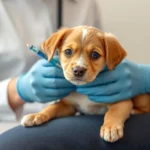
Swollen throats in dogs can be concerning for pet owners. Why is a dog’s throat swollen? This question is vital as it can be a sign of various health issues that may require immediate attention. Recognizing the symptoms early can make a significant difference in the health and well-being of your furry friend.
Understanding Dog Anatomy
Overview of Dog Throat Anatomy
To grasp the implications of throat swelling, it’s essential to understand the anatomy of a dog’s throat. The throat consists of several key structures, including the larynx, trachea, esophagus, and surrounding tissues.
- Larynx: This is the voice box that plays a crucial role in sound production and protects the airway during swallowing.
- Trachea: Commonly known as the windpipe, it connects the larynx to the bronchi of the lungs, allowing air to flow in and out.
- Esophagus: This muscular tube transports food from the mouth to the stomach.
The intricate design of a dog’s throat highlights its importance in breathing, swallowing, and vocalization. Any disruption in this structure can affect the dog’s overall health and well-being.
Functions of the Throat
The throat serves multiple functions:
- Breathing: The throat’s primary role is to facilitate breathing. Swelling can obstruct airflow, leading to serious respiratory issues.
- Swallowing: It aids in the swallowing process, guiding food and liquids to the stomach. If the throat is swollen, this function may be compromised.
- Vocalization: The larynx allows dogs to bark, whine, and communicate. Swelling can lead to changes in vocalization, indicating potential health problems.
Common Causes of Swelling in a Dog’s Throat
Allergic Reactions
One of the most common causes of dog throat swelling is allergic reactions. Dogs can be sensitive to various allergens, including:
- Food: Ingredients like chicken, beef, dairy, or grains might trigger a reaction.
- Environmental Allergens: Pollen, dust mites, and mold can lead to swelling.
- Insect Stings: Bites from bees or wasps can cause localized swelling.
If your dog has a swollen throat due to an allergic reaction, look for additional symptoms such as itching, hives, or gastrointestinal upset.
Infections
Infections are another significant cause of throat swelling. These can be bacterial, viral, or fungal in nature. Some common infections include:
- Kennel Cough: A highly contagious respiratory disease, kennel cough can result in throat inflammation and swelling.
- Canine Distemper: This viral illness can lead to multiple symptoms, including respiratory problems and throat swelling.
Other infections may also present with fever, lethargy, or discharge.
Trauma or Injury
Trauma or injury can cause swelling in a dog’s throat. This may result from:
- Falls or Accidents: Rough play or accidents can lead to bruising or injury.
- Foreign Objects: If a dog tries to swallow something too large, it may cause obstruction and swelling.
Signs of trauma-related swelling include visible bruising, pain, or reluctance to eat or drink.
Tumors or Growths
Tumors, whether benign or malignant, can significantly affect throat health. Common types include:
- Benign Growths: These may not pose a serious threat but can cause discomfort or obstruction.
- Malignant Tumors: These are cancerous and may require immediate intervention.
Symptoms to watch for include persistent swelling, difficulty swallowing, or changes in vocalization.
Other Medical Conditions
Several other medical conditions can manifest as swollen throats in dogs:
- Hypothyroidism: This condition can lead to various health issues, including swelling.
- Autoimmune Diseases: Conditions where the immune system attacks healthy tissues can cause inflammation and swelling.
Recognizing these underlying issues is vital for proper treatment.
Symptoms of a Swollen Throat in Dogs
Primary Symptoms
Recognizing the primary symptoms of throat swelling can help you react promptly. These include:
- Visible Swelling or Lumps: Check for any noticeable swellings around the throat area.
- Difficulty Breathing: Signs like stridor or wheezing indicate an obstructed airway.
Secondary Symptoms
In addition to primary symptoms, secondary symptoms may also occur:
- Excessive Drooling: If your dog is drooling more than usual, it could indicate discomfort.
- Coughing or Gagging: Persistent coughing or gagging can signal throat issues.
- Changes in Appetite or Drinking Behavior: A reluctance to eat or drink may indicate pain or discomfort.
When to Seek Veterinary Care
It’s crucial to understand when to seek veterinary care. Critical signs requiring immediate attention include:
- Severe Difficulty Breathing: If your dog is struggling to breathe, seek emergency care.
- Persistent Vomiting or Diarrhea: These symptoms can indicate a more severe underlying issue.
- Signs of Shock: Weakness, rapid heart rate, or pale gums require immediate veterinary intervention.
Understanding the difference between emergency and non-emergency situations can save your dog’s life.
Diagnosis of Swollen Throat in Dogs
Veterinary Examination
When you take your dog to the vet, expect a thorough examination. The veterinarian will assess:
- Medical History: They will inquire about any recent changes in behavior, diet, or environment.
- Physical Examination: A comprehensive physical examination will help identify visible swelling and other abnormalities.
Diagnostic Tests
To pinpoint the cause of throat swelling, your veterinarian may recommend diagnostic tests, including:
- Blood Tests: These can help identify infections or underlying conditions.
- X-rays or Ultrasounds: Imaging tests can reveal foreign objects, tumors, or other structural issues.
These tests are critical for developing an effective treatment plan.
Treatment Options
Home Care
If you suspect your dog has a swollen throat, there are initial steps you can take at home.
- Monitor Symptoms: Keep an eye on your dog’s behavior and any changes in symptoms.
- Maintain Hydration: Ensure your dog has access to fresh water, as hydration is essential for recovery.
Veterinary Treatments
Depending on the diagnosis, your veterinarian may recommend various treatments:
- Medications: This may include antihistamines for allergies, steroids to reduce inflammation, or antibiotics for bacterial infections.
- Surgical Options: In serious cases, surgical intervention may be necessary to remove tumors or foreign objects.
Always follow your veterinarian’s guidance regarding treatment.
Follow-Up Care
Follow-up appointments are crucial to monitor your dog’s recovery. Your veterinarian may suggest:
- Regular Check-Ups: Continued assessments to ensure your dog is healing properly.
- Long-Term Management Strategies: For chronic conditions, ongoing care may be necessary.
Prevention Strategies
Regular Veterinary Check-Ups
Routine veterinary check-ups are essential for maintaining your dog’s health. These visits allow for:
- Routine Health Assessments: Regular examinations can catch potential issues early.
- Vaccinations: Keeping your dog up-to-date on vaccinations can prevent certain infectious diseases.
Environmental Management
Managing your dog’s environment can reduce the risk of throat swelling:
- Reducing Allergens: Keeping the home clean and minimizing exposure to allergens can help.
- Safe Play Practices: Supervise playtime to prevent injuries that could lead to throat swelling.
Awareness of Breed-Specific Issues
Certain breeds may be more prone to throat problems due to their anatomy.
- Brachycephalic Breeds: Breeds like Bulldogs and Pugs may experience breathing difficulties.
- Tailoring Care: Understanding your dog’s breed-specific issues can inform your health care strategies.
Conclusion
Understanding why a dog’s throat is swollen is crucial for any pet owner. Recognizing symptoms early, seeking veterinary care when necessary, and implementing preventative strategies can significantly enhance your dog’s health and quality of life. Being proactive in your dog’s health care ensures they remain happy and healthy companions for years to come. Always consult your veterinarian for any health concerns, as they are best equipped to guide you in your dog’s health journey.









